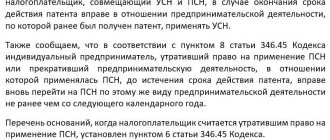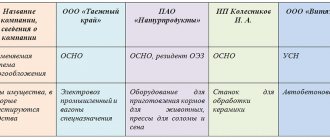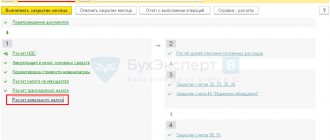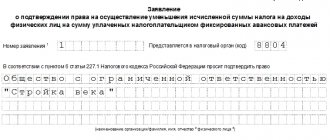Is it necessary to pay advances under the simplified tax system?
The obligation to calculate and pay advances according to the simplified tax system for any of the two objects of taxation is provided for in Art. 346.21 Tax Code of the Russian Federation. So the answer is: yes, definitely. You can avoid paying an advance only if there is nothing to pay. For example:
- The simplifier with the object “income minus expenses” received a loss.
- An individual entrepreneur with the “income” object reduced the payment to zero. Let us remind you that only individual entrepreneurs who do not have employees can do this.
IMPORTANT! Individual entrepreneurs who have employees, as well as organizations, through deductions, can save no more than half of the tax under the simplified tax system “income”. Therefore, they will have an advance payment in any case. Well, if there was income, of course.
So what happens when the advance is not paid? Let's talk.
How will a simplifier be punished for non-payment of advance amounts?
The only measure of liability that is provided for non-payment or late payment of advances is penalties. And regarding penalties for the single tax under the simplified tax system, there is such a nuance: during the year, tax authorities do not know whether the taxpayer must pay advances, and if so, what amount. After all, the declaration, which presents all the information on advances for each quarter, is submitted at the end of the year. During the year, an individual entrepreneur can reduce the amount of the advance with the help of deductions in the form of paid insurance premiums to 0, the amount of income may be lower than the amount of expenses under the income-expenditure simplified tax system, and in general the business entity may simply not carry out activities.
Thus, only after receiving a tax report can inspectors calculate the amount of penalties for each period and issue a demand to the taxpayer.
Penalties on tax advances under the simplified tax system
The most well-known and expected consequence of non-payment of advances under the simplified tax system, and for any taxes advancing the budget, is penalties. They are calculated from the unpaid amount for each day of delay, starting from the next day after the end of the payment period and up to and including the day of payment. The penalty rate for individual entrepreneurs is 1/300 of the refinancing rate, for organizations - 1/300 of the rate for the first 30 days of delay and 1/150 starting from the 31st day. The amount of penalties cannot exceed the amount of the payment for which they are accrued (Article 75 of the Tax Code of the Russian Federation).
ATTENTION! If at the end of the quarter you have not paid the full amount of the calculated advance, the tax authorities will charge penalties for the underpaid amount. But this is the rule here. If the tax at the end of the year is less than the calculated advances, then penalties should be proportionately reduced. The Federal Tax Service should reduce the calculated advances to the amount of tax for the year, determine which part of it was not paid, and charge penalties only on it. Accordingly, when the difference between the advances made and the tax amount for the year is zero or negative, there are no penalties at all (Letter of the Federal Tax Service dated January 13, 2020 No. SD-4-3 / [email protected] ).
Read more about calculating penalties on our website.
Our calculator will help you calculate them.
Is it possible to reduce the amount of penalties? Find out in ConsultantPlus. Get free demo access to K+ and go to the material to see a detailed answer to this question.
Sanctions for violation of deadlines for payment of taxes and advance payments
If an organization or individual entrepreneur does not pay the tax on time, then liability arises under Article 122 of the Tax Code of the Russian Federation. This is a penalty of 20% of the unpaid tax amount. If the tax inspectorate considers that the tax was not paid intentionally, then the fine will double – 40%.
But liability for non-payment of advance payments is provided for by another norm - Article 58 of the Tax Code of the Russian Federation. According to it, fines for non-payment in this case are not imposed: “Violation of the procedure for calculating and (or) paying advance payments cannot be considered as a basis for holding a person accountable for violating the legislation on taxes and fees.”
For violation of advance payments under the simplified tax system, the inspectorate has the right to charge only penalties: “If advance payments are made later than the deadlines established by the legislation on taxes and fees, penalties will be charged for the amount of late advance payments.”
A penalty is a kind of sanction for late payment, but it is not a fine. The amount of the penalty depends on the period of delay, so the longer you do not pay advances, the more you will have to pay.
Penalties are calculated differently for individual entrepreneurs and organizations:
- individuals pay 1/300 of the refinancing rate of the Central Bank of the Russian Federation in force during this period for each day of delay;
- legal entities pay 1/300 of the refinancing rate for each day of delay up to 30 calendar days, after which the rate increases to 1/150 for each day.
Thus, starting from the 31st day of delay, the organization will pay more penalties for non-payment of advance payments than the individual entrepreneur.
Explanations to the tax office according to the simplified tax system
Without waiting for any payments, the tax office may ask you to explain. In this case, you will receive an information letter asking you to tell why there is no money. If you have a reasonable and well-reasoned explanation for this, please respond. But if you don't answer, nothing will happen to you. This is not a request for explanations, for failure to provide which there is a fine, but just a letter. Let us remind you that the tax office has the right to request information or documents in limited cases, and this does not apply to them.
How to calculate advance payments and tax according to the simplified tax system
To calculate advance payments (tax) according to the simplified tax system, you will need two amounts:
- amount of income for the period (1st quarter, half year, 9 months, year),
- the amount of insurance premiums paid by individual entrepreneurs during this period.
The amount of income is taken from section I, the amount of contributions - from section IV of the book of accounting of income and expenses (KUDiR) for the corresponding period.
Attention ! All calculations in this article are suitable only for individual entrepreneurs on the simplified tax system for income without employees.
Advance payments (tax) under the simplified tax system are calculated using the formula:
N = D × 6% − B − C, where
- N is an advance payment (tax) according to the simplified tax system,
- D is the amount of income for the period (1 quarter, half year, 9 months, year),
- B are the insurance premiums paid in this period,
- C is the amount of previous advance payments.
Example . If in 2022 an entrepreneur earned 1.5 million rubles, he paid insurance premiums of 40,874 rubles. and advance payments under the simplified tax system are 20 thousand rubles, then the tax under the simplified tax system will be: 1,000,000 × 6% − 40,874 − 20,000 = 29,126 rubles.
Fine under the simplified tax system, collection of advances, seizure of property, account blocking
Tax authorities do not have the right to impose a fine for non-payment of advances under the simplified tax system. First of all, because a fine can only be issued for non-payment of tax for the year. For failure to pay advances under the simplified tax system, such liability does not apply. In addition, in order to receive a fine, you must distort the tax base, and you have not yet declared it.
As for the collection of uncollected amounts, seizure of property and blocking of an account, none of the indicated actions in relation to advances not paid by the simplifier during the year is impossible. To carry out each of them, tax authorities must have accurate information about the amount of arrears. But with advances under the simplified tax system before the taxpayer submits a declaration, this is impossible.
When you submit it and the tax authorities see the whole picture, then you cannot avoid demands for payment. Moreover, they will charge it for the entire amount of advances for the year, even if at the end of the year there will be less tax or no tax at all. Fail to pay, and the money will be forcibly written off. But this can also be circumvented: simply postpone submitting the declaration until the last day of the reporting period.
We described how this method works here.
Procedure for making advance payments on the simplified tax system
Organizations and individual entrepreneurs who have chosen a simplified tax regime are required to make single tax payments to the budget within a year at the end of each reporting period - the 1st quarter, half a year and 9 months.
These payments are advance payments, since the tax period for simplifiers is designated as a year and until it ends, the total cannot be summed up. The total tax amount is calculated in the declaration and transferred only at the end of the year: by entrepreneurs - by April 30, by organizations - by March 31. But the terms for paying advances are the same for everyone:
- for the 1st quarter, payment is made until April 25;
- for half a year - until July 25;
- 9 months before October 25th.
If the specified dates fall on weekends or holidays, the deadline for payment of tax obligations is shifted to the next business day.
Payment deadline for tax agents
Organizations using the simplified tax system are not exempt from the duties of tax agents (clause 5 of article 346.11 of the Tax Code of the Russian Federation). These organizations can act as tax agents in the following cases (Article 161 of the Tax Code of the Russian Federation):
- during the period of renting property from the administration;
- when purchasing goods/services from foreigners for further work with them on the territory of the Russian Federation;
- when purchasing vacant municipal property.
Thus, organizations exempt from VAT become tax agents for the payment of VAT for the period of renting municipal property or transactions with foreigners.
VAT payment deadline for tax agents:
- 1st quarter – April 25;
- 2nd quarter – July 25;
- 3rd quarter – October 25.
Organizations with the right of the simplified tax system can include the payment of VAT as expenses.
Calculation of advance payments under the simplified tax system: assorted questions
Author: Novikova S. G. , magazine expert
Based on the results of the reporting periods, “simplified” residents (regardless of the chosen object of taxation) are required to make advance payments. In this case, the calculated amount of the advance payment to be paid to the budget is adjusted for advance payments of the previous reporting period (which is logical), and the so-called tax deduction. It consists of the amounts of paid insurance premiums, sick leave payments, contributions under personal insurance contracts for employees and trade tax (if it is established in the region). In short, the mechanism for calculating advance payments under the simplified tax system is quite simple. However, there are situations where the rules are not so obvious.
What are advance payments
A contribution under the simplified tax system is the estimated amount of duty that must be paid and contributed to the state budget after the reporting period. When the 1st quarter ends, the amount of tax at the time of its end is calculated and paid. Next, a calculation is made based on the results of two quarters, minus the tax paid in the first quarter. The difference is transferred to the treasury.
Using the same principle, calculations are made for three quarters (with the deduction of tax paid for the first six months of the reporting period). At the end, the total tax must be calculated.
Various situations may arise throughout the year (the organization receives benefits that exceed the so-called planned norms, or does not receive it at all), so the final amount may require additional payment of tax or deduction from the treasury.
There are a few things to be aware of:
- The tax period is 12 months. The income statement is drawn up and submitted based on annual results.
- There are three reporting periods - 1st, 2nd and 3rd quarter. Upon completion, the declaration is not drawn up or submitted. During these intervals, the advance payment is calculated and paid.
Is it necessary to pay them?
Important! Advance payments are required. They must be paid within a calendar year. This provision is specified in the Tax Code of the Russian Federation.
If you have not made advance payments under the simplified tax system due to late payment or refusal to pay, the tax service charges a penalty or issues penalties. For timely payments, it is important to use special services that simplify accounting activities.
Despite the understanding that the annual tax amount will be lower than the advance contributions, they must be paid throughout the entire calendar year. As a result of the tax year, there may be an overpayment of taxes. The overpayment is returned and counted towards payments for the next calendar year.
Liability and penalties for non-payment
Article 122 of the Tax Code of the Russian Federation states: “For late advance payments, the taxpayer is obliged to pay a penalty for each day of delay.” The amount of the penalty is calculated according to a special formula prescribed by Article 75 of the Tax Code.
The formula takes into account the amount of the unpaid payment, the number of days (overdue) and the refinancing rate at the time of settlement. Penalties are calculated daily, regardless of weekends.
The countdown of days begins after the expiration of the last day by which payment is due and until the amount is paid in full. On the day of payment of the advance and penalty, no penalty is charged. The regulation for stopping the accrual of penalties is prescribed in Article 75, Section 7 of the Requirements approved by Order of the Russian Tax Service of 2012 No. YAK-7-1/9.
Important! Penalties for late or non-payment are not provided for in the tax code.




